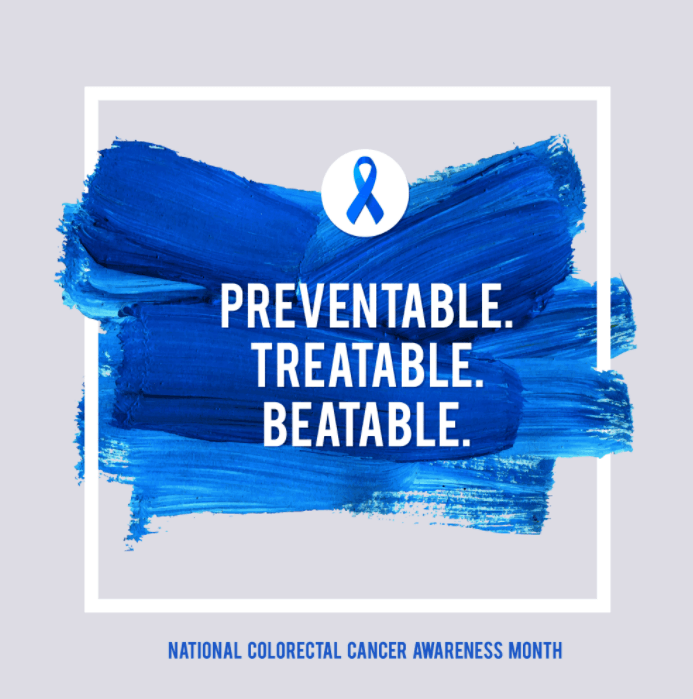Colorectal Cancer Awareness Month
March is National Colorectal Cancer Awareness Month. In preparation, we shared a lot of information on colorectal cancer in our last newsletter. This month, we want to reiterate ways to be an ally for colorectal cancer awareness.
Why? Quick recap: This cancer is expected to climb to the number one cancer causing death for all people 20-49 years old by 2030. Together, we can work to change this trajectory.
The top things you can do this month to help are:
- Get Screened. Colorectal cancer can be preventable and treatable when it’s caught early enough. It’s tricky because there can be no symptoms! The only way to catch colorectal cancer early is to get screened for it. If you haven’t already this year, schedule your screening.
- Encourage others to get screened. There’s a misconception that only older men get colorectal cancer. Many people feel safe because they don’t fall into this category, but it’s simply not true. Not only is colorectal cancer on the rise rapidly for people under 50, but the distribution between men and women is not as spread out as people think. Make sure to tell all your close ones to schedule a screening if they haven’t already.
Visit our “Understanding Colon Cancer Screenings” patient education piece for even more information.
Provider Spotlight

Interview with Dr. Steven Taylor MD
How long have you been practicing medicine and what made you choose the profession?
32 years. Two of my older siblings were RNs and inspired me to consider medicine as a career.
What led you to choose gastroenterology as your specialty?
Gastroenterology had the perfect mix of cognitive and procedural elements that made it fun. It still is!
How do you approach diagnosis and treatment for your patients?
Diagnosis and treatment of alarming symptoms requires an aggressive approach but the majority of patients in my speciality have a mixture of functional and structural issues that allows for a more relaxed interactive approach.
What is something you wish all patients knew about their digestive health?
Gastrointestinal health reflects a complex interplay between diet, physical, genetic, and emotional factors. Considerations of only one area rarely produces a long-lasting solution.
What are the most important preventative screenings in your speciality?
Statistically, it’s for colon cancer and esophageal diseases.
What diseases or conditions do you specialize in the treatment of?
Colon cancer, reflux, and inflammatory bowel disease.
What do you think is the most pressing health issue affecting patients today in terms of their digestive health?
Obesity and associated fatty liver disease which can lead to silent cirrhosis and liver failure.
How do you stay up to date on the latest in medical news and technology?
Journals and online subscriptions together with national meetings and interaction with peers.
Outside of gastroenterology, what are your hobbies and interests?
Cycling, pickle ball, skiing, hiking, and travel, especially with my spouse/family.
What is your favorite part of working with the team at Granite State Gastro?
Truly kind, compassionate and competent people who I enjoy seeing even on my time off.
Patient Education

What exactly is GERD?
In September, we discussed when to visit a doctor if you have GERD symptoms. This month, let’s take a step back and talk about GERD at a higher level.
Many of you have likely experienced acid reflux from time to time. It’s uncomfortable! Typically, when you’re experiencing acid reflux, you’ll feel heartburn. Heartburn causes burning pain or discomfort starting from the stomach and going up to the chest or throat. It can last as long as two hours. Acid reflux can also cause a sour or bitter-tasting acid to come up into your throat or mouth.
As if that isn’t enough, acid reflux can bring more symptoms, including bloating, burping, a feeling of food stuck in your throat, coughing or breathing problems, and even nausea or vomiting. GERD is gastroesophageal reflux disease, which is a digestive disorder. It’s classified with symptoms of acid reflux two times a week or more.
Why does GERD happen? Well, there’s a ring of muscle between your esophagus and stomach that allows food to enter the stomach, called the lower esophageal sphincter, or LES for short. The LES opens to let food flow through and then closes to contain the food and the acidic stomach juices breaking down the food from going back into your esophagus. For someone with GERD, this muscle opens back up when it’s not supposed to and lets food and acid flow up, which results in those uncomfortable symptoms.
There can be multiple causes for the LES being weaker than it should be. At Granite State Gastroenterology, we can help diagnose what is causing your GERD and help you with a customized plan for recovery. We will ensure that it addresses your cause and fits well in your lifestyle. After all, no one wants to deal with those symptoms repeatedly!

